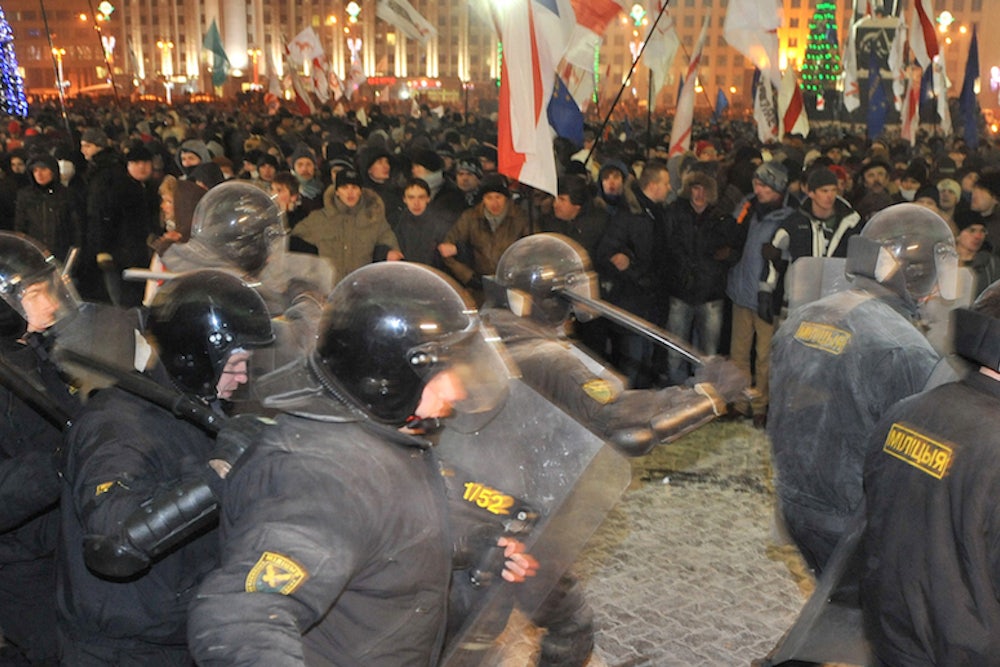When people first started gathering in Kiev’s Independence Square last fall, a casual observer might have written off the protests as a repeat of what happened to protest movements in Belarus and in Russia over the past several years—and understandably so. The three countries are close-knit; Ukraine and Belarus might as well be Russian satellite states. The Eurasian Economic Union that Putin plans to launch in 2015 will (if he has his way) consist of Belarus, Russia, Ukraine, and Kazakhstan. The Belarusian secret police are still called the KGB, and Russian Patriarch Kirill I even called the three countries “the core of the Russian World today.”
But there are important differences. Like in Ukraine, thousands of people repeatedly took to the streets in Russia and in Belarus to protest election fraud and government abuses. Then their governments cracked down hard, injuring and imprisoning hundreds of peaceful protesters on charges of “hooliganism” and worse. Those protests dissipated and the authoritarian governments remained. What’s happening in Ukraine is more violent and is already bringing more political change than ever happened in either Belarus or Russia. The U.S. and E.U. might impose sanctions toward Ukraine, Ukrainian President Viktor Yanukovych has signalled that he may be open to holding early elections, and the Ukrainian parliament has voted to end the crackdown. The strength of the Euromaidan protests stems in part from the experience of watching neighboring protest movements disappear. Ukrainians have seen authoritarianism win time and again and remember the success of the 2005 Orange Revolution, which brought Yanukovych's rival Viktor Yushchenko to power.
Belarus, Ukraine’s fellow satellite state and Europe’s last dictatorship, is a worst-case scenario for what happens to protest movements in former Soviet states. In December 2010, President Alexander Lukashenko won his fourth presidential term by rigging the elections to give himself 80 percent of the vote. During Lukashenko’s presidency, “the former Soviet republic has never held a poll seen as fair by international monitors,” according to the BBC. Massive protests broke out in Minsk’s very own Independence Square, and five opposition presidential candidates were jailed. Like in Ukraine, protesters stormed government buildings and were beaten down by riot police. Lukashenko’s government outlawed unsanctioned street protests, and the people responded by staging “silent” protests. Then Lukashenko banned those too, and continued to arrest hundreds. Belarus now resembles “something akin to a prison colony,” as Belarusian journalist Andrej Dynko put it.
“What happened in December 2010 in Minsk is today happening in the Ukrainian Maidan,” Belarusian activist and politician Andrei Sannikov remarked at a meeting in Norway earlier this month. Sannikov was one of the opposition candidates who ran against Lukashenko in 2010, and now Lukashenko’s government is trying to reappropriate the 2010-2011 protest movement as part of a patriotic Belarusian narrative. The Ministry of Culture is financing a film, Abel, that will tell the story of the struggle between two Belarusian brothers during the unrest following Lukashenko’s election; one of them supports Lukashenko, the other the opposition—and guess which one is Cain. The film is a government-sponsored response to a Polish movie, Viva Belarus!, that tells the story of the 2010 youth uprisings. Abel promises to give an “objective” view of the protests and started filming in Minsk last month.
Meanwhile, the Belarusian opposition is looking to Kiev with hope, even though dominant Russian news networks in Belarus have ensured that most Belarusians have a negative view of the uprisings. What happened in Minsk cannot and (hopefully) will not happen in Kiev, where the Ukrainian parliament has already voted to pull its troops away from the protesters and pardon those who are imprisoned. But with the death toll rising and Russia’s assurance that its first $2 billion is on the way, it's unclear what kind of political change will result from the protests. What is clear at this point is that the protests have violently separated Ukraine from Belarus and the rest of Putin's aspirational economic union, and with any luck, they won't be co-opted into a patriotic propaganda film project.
